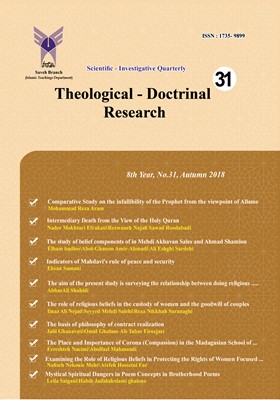The role of religious beliefs in the custody of women and the goodwill of couples
Subject Areas : Islamic theologyIlnaz Ali Nejad 1 , Seyyed Mehdi Salehi 2 * , Reza Nikkhah Saranaghi 3
1 -
2 -
3 -
Keywords: Religious beliefs, disbelief, atheism, certainty, nature, intuition, proof.,
Abstract :
In the religious belief of man in the direction of the kind of being, "there is" a god, derived from him and his ultimate destination is to reach God, and the purpose of his life and purpose is to "receive Allah; in the religious texts, There is a lot of commitment that empowers them to strengthen and strengthen the goodness of couples. Couples, through the pattern and assumption of children, play a large role in the tendency of children to worship and spirituality; among couples who have a practical commitment to beliefs and worship, psychological relaxation, inner luminance, and ethical issues, hope, material and spiritual progress And the sense of conscientiousness towards others amongst couples who believe in religious beliefs and worship is very high. Although women are the main pillars of the family and make up half the population of the country, it is less visible that attention to the human rights of women is reflected in the laws, and many of the rights of this group of society are not only women but also as Mother is overlooked. In other words, it can be said that women are deprived of many natural, social and other rights due to being women. The purpose of this article is to examine the role of religious beliefs about the right of custody of women, the right of women to custody in Islamic law and international law and good socialization. For this purpose, the library method has been used.
آرتی دار، طیبه (1382) قوانین و مقررات ویژه زنان در جمهوری اسلامی، تهران، زیتون
آزموده، پيمان و همكاران، «نقش دين در زندگي»، روانشناسي، ش41، 1386.ص 25 ـ 40
ابراهیمی، محمد، (2010) میثاق بین المللی حقوق مدنی و سیاسی، پژوهشکده باقر العلوم،
جمعی از نویسندگان (1382) تقویت همکاری های بین المللی در زمینه حقوق بشر، انتشارات دانشکده حقوق و علوم سیاسی دانشگاه تهران.
حمیدی، فریده، قاسمیان، پروانه، صباغ نوین، سولماز (1382) حقوق زنان، حقوق بشر، تهران، انتشارات روشنگران مطالعات زنان.
صفایی، حسین، امامی، اسداله (1390) مختصر حقوق خانواده، چاپ بیست و ششم، تهران، میزان.
عبادی، شیرین (1373) تاریخچه و اسناد حقوق بشر در ایران، تهران، روشنگران.
عظیم زاده اردبیلی، فائزه، خسروی، لیلا،( 1388)مطالعه تطبیقی حقوق زنان از منظر اسلام و غرب، جلد 4، تهران، مرکز امور زنان و خانواده نهاد ریاست جمهوری.
مشایخی، قدرت الله، (1381) حضانت از دیدگاه فقه و حقوق، سال دوازدهم، شماره 41.
مهرپور حسین (1377) نظام بین المللی حقوق بشر، تهران، انتشارات اطلاعات.
قرآن کریم
نجفی، محمد حسن(1404) جواهر الکلام فی شرح شرایع الاسلام، بیروت، دار احیا التراث العربیه
روضة المتقین،
طبرسى، فضل بن حسن، مجمع البيان فى تفسير القرآن
بیگدلی، سعید (1390) مشکلات و خلاهای قانونی نهاد حضانت در نظام حقوقی ایران، دو فصلنامه فقه و حقوق خانواده (ندای صادق)، شماره 55.
پورعبدالله، كبري (1392) حق و منسب بودن حضانت و آثار حقوقي آن، دو فصلنامه فقه و حقوق خانواده (نداي صادق)، شماره 58، تهران.
توحیدی، احمد رضا، (1391) تحول حقوق زنان و خانواده در اسناد بین المللی، منطقه ای و حقوق ملی، فصلنامه شورای فرهنگی اجتماعی زنان و خانواده،.
کریمی، عباس، محسنی، الهه (1393) موانع اجرای حضانت درفقه امامیه، حقوق ایران و حقوق فرانسه، فقه و مبانی حقوق اسلامی، سال چهل و هفتم شماره دوم.
مهدي محمديان اميري (1388) حق حضانت و مدت آن، فصلنامه پژوهش هاي فقه و حقوق اسلامي ، شماره 17.
ولایی،عیسی (1374) فرهنگ تشریحی اصطلاحات اصول. تهران، ، نشر نی. فصلنامه دانشکده حقوق و علوم سیاسی، بهمن 1370، تهران، دانشگاه تهران، ش 4
اعلامیه جهانی حقوق بشر (مصوب 1327)
میثاق بینالمللی حقوق اقتصادی، اجتماعی و فرهنگی (مصوّب 1345)
کنوانسیون رفع کلیه تبعیضات علیه زنان (مصوّب 1358) .

